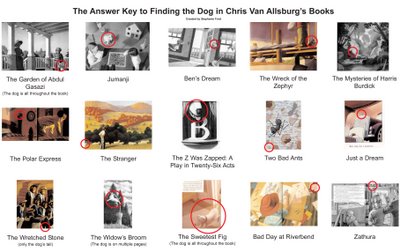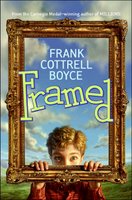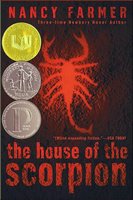There are several reasons I haven’t been posting much here. It’s partially due to having three blogs, and it’s also partially due to being behind in pretty much every area of my life, but it’s mostly due to the fact that I read I few books that I didn’t like, and I wasn’t sure whether or not I should review them. Lucky for me, the children’s lit blog world has been discussing whether or not children’s literature bloggers should post negative reviews (read Jen Robinson’s take on it
here and Fuse #8's opinion
here). The discussion got me thinking about where I stand, and I think I’m finally ready to start reviewing again.
Here are my thoughts. I originally started this blog a year and a half ago to keep my fellow children’s literature book clubbers updated about book club. Eventually, I started posting my personal book reviews here instead of my personal blog because I figured the book club members were interested in them and any of my family and friends that were interested could easily read them here too. I am thrilled that other people have started reading this blog, but I still primarily review books here simply to let my friends know what I think about them. If a book I recently read came up during a book club meeting, I wouldn’t feel bad about saying that I didn’t like it, and why should that change on this blog?
Hopefully everyone reading this blog knows that I strongly believe every reader connects to a book differently because they bring different experiences and knowledge with them so each person has a unique interaction with each book they read. I’m always so excited to go to book club and hear that someone else had a completely different reaction to a book than I did because I often learn so much from their explanation of why they felt the way they did about it.
While I hate negative reviews that basically say something to the gist of, “I think this books sucks. Don’t read it.” I find negative reviews that explain the reasons for the reviewer’s dislike so interesting. In fact, a good friend recently told me that she’s never liked the book Stargirl by Jerry Spinelli, which happens to be one of my favorite books and I immediately wanted to know more; I wanted to hear why, and I was glad I listened and learned, even if I didn’t agree.
Sometimes I read a negative review and think, “Yikes, I already know this is a book I won’t like. Thanks for the warning.” Other times I read a negative review, and think I might actually like a book for the same reasons a reviewer hated it. I recently heard from two friends who read a review I wrote about a book that I didn’t particularly like and they both went right out and picked the book up because the review made them interested in it, and I think that’s the way it should be.
I wish there was a book God out there that would send me a message every time I finished a book to let me know which book I should pick up next because I will absolutely fall in love with it, but there isn’t. Instead I’ll have to browse on my own and use my good judgment along with a little help from some reviewers and friends whose opinions I’ve grown to respect and appreciate.
Besides, I need to pick up some books I don’t like once in awhile or at least read about them because they make me appreciate other books all that much more.
 Some book club members recently asked me when the next Shannon Hale book is coming out and I realized that I forgot to review River Secrets. River Secrets is the third book in the Goose Girl series about the people of Bayern. This book follows Razo, a boy Isi met in the first book when she worked as a Goose Girl. In an effort to keep peace with the kingdom of Tira, Bayern sends an ambassador accompanied by Enna (a fire-speaker) and a group soldiers. Razo is happy to be included, but he is surprised to be chosen to go when he knows he isn’t a very strong soldier. Razo may be the smallest and the weakest, but he was chosen for the strengths he didn’t know he had and was soon to discover. On the journey he discovers a charred body and doesn’t know if Enna is burning again or if someone wants people to suspect that she is. Through his investigations he’s easily able to make friends with many Tirans high and low in stature and he becomes the best hope the people of Bayern have to keep peace.
Some book club members recently asked me when the next Shannon Hale book is coming out and I realized that I forgot to review River Secrets. River Secrets is the third book in the Goose Girl series about the people of Bayern. This book follows Razo, a boy Isi met in the first book when she worked as a Goose Girl. In an effort to keep peace with the kingdom of Tira, Bayern sends an ambassador accompanied by Enna (a fire-speaker) and a group soldiers. Razo is happy to be included, but he is surprised to be chosen to go when he knows he isn’t a very strong soldier. Razo may be the smallest and the weakest, but he was chosen for the strengths he didn’t know he had and was soon to discover. On the journey he discovers a charred body and doesn’t know if Enna is burning again or if someone wants people to suspect that she is. Through his investigations he’s easily able to make friends with many Tirans high and low in stature and he becomes the best hope the people of Bayern have to keep peace.




